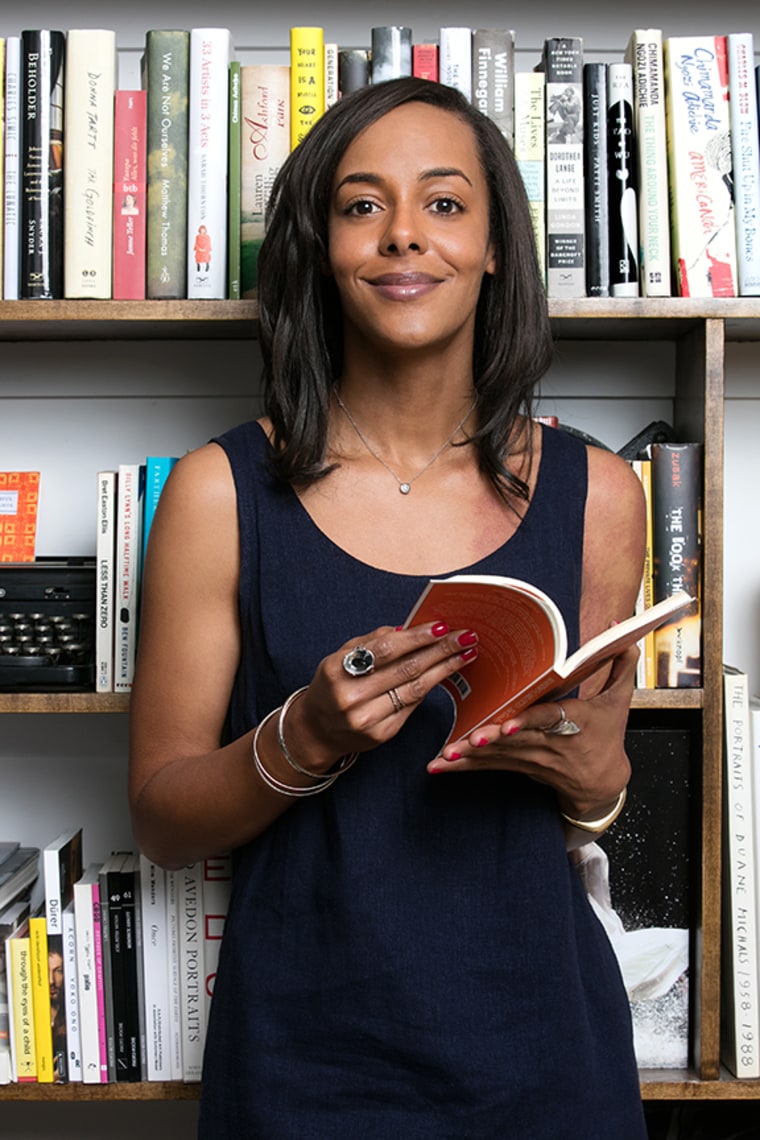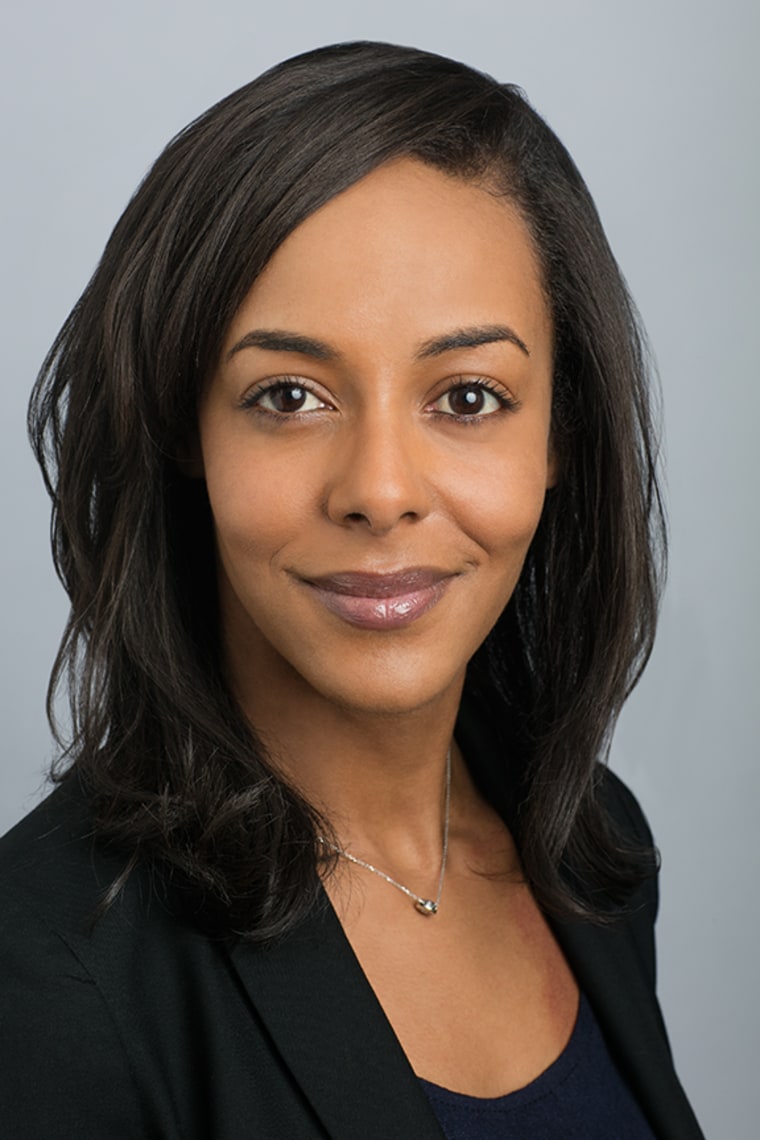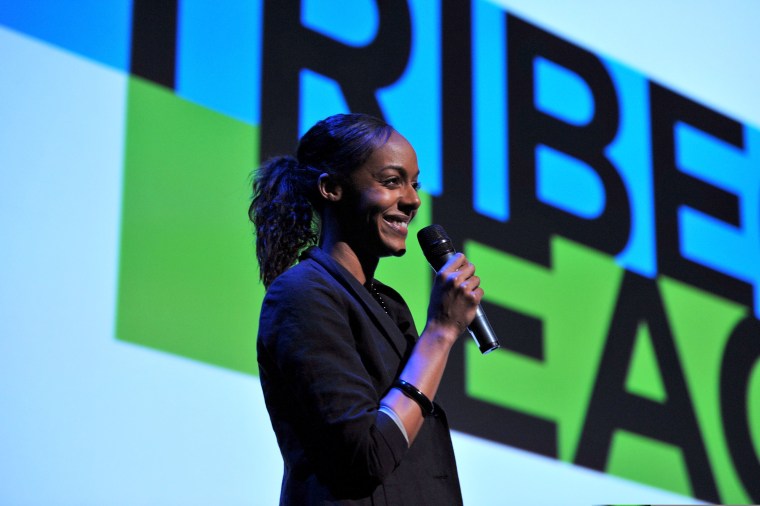The publishing world had a lot to be excited about when it was announced that Guernica’s Lisa Lucas would be the National Book Foundation’s new executive director.
If there is one thing clear to anyone speaking to Lucas, it is her passion and enthusiasm for books and reading. And it’s infectious. With Lucas at the forefront of the National Book Foundation and Awards, the future of publishing looks very bright. On Monday, the National Book Foundation announced their longlist for Young People's Literature for the 2016 National Book Awards. (Poetry, Fiction, and Non-Fiction honorees will be announced this week.)
NBCBLK had a chance to connect with Lucas both before and after she took on her new role at the National Book Foundation. Here’s what Lucas had to say about diversity, eclectic career paths, “The Other NBA” and of course, the world of publishing and her new role in it.

The last time we spoke, you hadn’t started in your position as Executive Director yet. How’s it going?
It’s going great. I feel very much like I work here. I can’t imagine anything that I’d rather be doing. The first few months you spend a lot of time figuring out how to do your job. And figuring out whom you work with and what’s working and what maybe isn’t working and what can be improved.
It’s been a lot of work. It’s been really satisfying work just keeping the ship steady and thinking about where we can go. I think the most exciting thing has been how excited everyone is about the possibilities and where we can go. We are a little non-profit organization that has a big outside voice. So growing will be based on partnership and so that enthusiasm, that excitement means great things for us because there are a lot of people who we can work with and ways we can amplify the work that we are doing now.
You mentioned that one of your goals is to attract more readers in your new role as executive director of the National Book Foundation. How do you intend to do this?
I keep getting asked that question and I keep not answering it, but it really is because I think the answer is taking a step back now that I am in place, knowing what I believe in, knowing what the staff and the board believe in and trying to harness all that energy into something that can be more accessible. I’d like more people to engage with the Awards, [as] that’s the biggest program.
RELATED: Civil Rights Icon John Lewis is a National Book Award Finalist
All year long you read books, you think about books, you celebrate books and then there is a night [The National Book Awards). There are so many people and it’s not just about celebrating the winners, it’s about celebrating the National Book Awards happening and how do you make that magic feel exciting to someone who lives in Tennessee, someone who lives in California or someone who lives in Arizona, if they love books? We need to make it the literary version of the Tonys and the Oscars.
The second task are our programs which are designed to engage readers more broadly- Book Up which is a program for young people that helps encourage life-long reading. There’s NBA on Campus and Innovations in Reading – they are all different programs and figuring out how you further cultivate those sorts of audience development programs, which is in essence what it is. We’re a reading organization, not a writing organization, although we do celebrate great writing.
On June 15th “The other NBA” happened—which The Observer’s Dana Scwhartz wrote in an article subtitled Nerds should be the only ones allowed to play sports, “I would definitely become a basketball fan if every single game were played by literary professionals.” Can you tell us a little bit more about this program which included Ta’Nehesi Coates’ editor, Chris Jackson?
During the National Book Awards sometimes people get confused with our hashtag which is NBAawards – people are like, wait, the NBA? The NBA is having an award? We started a basketball fundraiser called “The other NBA” and that’s a game where writers and editors play against each other in a basketball game to raise money for Book Up, which is our educational program to encourage readership and to develop home libraries in middle school students. We work in Detroit, Texas and here in New York.
We brought all these people together and we played basketball at St. Francis College. We had cheerleaders, we had a half-time game, we had jerseys, our sponsors were Out of Print and Litsy—they’re the ones who make the Moby Dick and Invisible man t-shirts and the cool mugs, and so they made us t-shirts and jerseys. It was really nice to see people coming out. It was very literary. There were lots of writers, editors, poets, publishers, and booksellers, people who work for Publisher’s Weekly, librarians playing basketball.
RELATED: 11-Year-Old Reaches Goal, Collects 1000 'Black Girl Books' To Donate
It was the publishers (I was the coach) versus the writers. Dan Sheehan who works for Lit Hub and Guernica was the coach there. My team lost for the second year in a row. But next year we’re going to win. It was so much fun.
What does inclusivity in publishing mean to you?
A lot of people think about publishing as very New York City based, elite, very Ivy League, that it’s a bunch of people from up on top deciding what people down below should read. When I take a look at publishing and I take a look at where I came from within publishing over the past few years [Lucas is the former publisher of Guernica], it feels really important to recognize the power of the major publishers and the work they do, but also to think about all the small presses around the U.S., not just in New York—Coffee House Press in Minneapolis, to think about California, to think about Texas, to think about Florida and to think about the fact that if these things are springing up all over the country, it means that there is an audience there, there’s a reader there who wants to feel a part [of publishing].
I was lucky; I grew up in a household of readers. I grew up in New Jersey, just outside of New York. Everything was in my favor, but I also come from a community that is marginalized. So I understand that marginalization in other folks and that’s important to me.
Whether it is somebody who is living in Appalachia and is really interested in reading— it doesn’t matter who you are, it doesn’t matter what you look like, it just matters that you are considered a party to this. That’s where I come from, thinking about inclusivity—don’t leave people out because when you’ve been left out you understand how lame that can be.
You’ve had an impressively diverse and original career path, from fundraising at Sundance to publisher at Guernica. What advice do you have for others who are attempting to create their own professional path?
A lot of people say that they wish they could do something. Show up. Be a part. I find that within the cultural community, it truly is a community. And being a part of that community opens up many doors. And I think sometimes people isolate themselves and send out resumes or they have to set up informational interviews and think that’s the only way to get a job.
RELATED: Denene Millner Makes Her Imprint on Books for Black Children
Part of it is about being in the world, doing the actual work everyday and learning about it. I’ve always been culturally obsessive. I always have been. I decided that I like comic books and I’m going to be at the comic book shop once, twice, three times a week asking every book clerk what comes before this? What comes before that? What should I read? Tweeting about it all day long. And then you become informed.
The world of publishing is regularly criticized for its lack of diversity. What are your thoughts on this?
I remember Isaac Fitzgerald came out of the gate at BuzzFeed Books and said, “I’m not writing negative. I don’t want to do that.” And I remember thinking, “What? That’s ridiculous.” But you know what? It’s not ridiculous. I have to be positive. I have to believe in publishing and in their good will. They need to be encouraged and supported for every step forward.
I think that sometimes publishing doesn’t know what it’s doing. It’s a bunch of nerds who believe in books.
We have to think equitably. We have to think inclusively about how to find those readers, how to court them and serving them with excellent literature.
I’m a resource and everyone I know is a resource. There’s stuff happening. When I see Chris Jackson [National Book Award Ta’Nehisi Coate’s editor] empowered at Spiegel and Grau, when I see Beacon bringing on senior editors of color, when I see me appointed to this job by people at huge publishing houses. You look at who our board is and they hired me for one of their favorite projects.
I think sometimes, not that I would counsel patience for any marginalized community, but I do think we do have, we would like things to be done now. Because it’s been a very long time. But the reality is, no matter how much we want it done it’s going to take some time for things to truly shift. Some of it is generational. Some of it is just that people are in jobs that they stay in for 10-15 years and so it’s just going to take some time before the cycle changes.
I am optimistic and I think it’s on everybody’s mind. Nobody is fighting against it. There is just a lack of understanding on how to change it and I think that information is coming fast and furiously. I think it is going to be better. I just feel positive, supportive. I feel good.

What are some of the challenges you see in publishing?
I think there is an issue in publishing. I think a lot of it has to do with administration and marketing. Everybody talks about it, everybody has their own feelings about it, and they’re coming from their own personal place in the world. But for me I feel like I’ve been reading like 8 books over the past couple of weeks and all of them are these interesting, global brand, multi-colored reading experiences and they're great and it’s there. What does it matter if you don’t know that it’s there? What does it matter it’s selling 2000 copies?
For me it’s about acknowledging that there is an audience for all sorts of different books. There’s a book called "Ugly Girls" by Lindsey Hunter, that came out two years ago. That book spoke – it’s a book about white women, and she’s a white woman, but it spoke to a demographic that I don’t think anybody is marketing to. It’s this girl, who grew up in trailer and sort of going through her life. It’s a beautiful story, a wonderful book and I don’t see anybody saying, how do I reach that reader? So I think you have to have people who come from that background to say, 'I know how to reach that reader, I know what they’re watching, I know that they want to read books' or 'I know how to develop a chocolate colored pill that will get them to read this book.'
I think that especially with African American literature, Latino literature, having people who come from a background who know what the magazines are, who know what the media outlets are, know the reporters. Having publicists, who understand the marketplace, is huge. Obviously there is an editorial issue—there are not that many editors of color, you can count them.
Forget about all the warm and fuzzy things that diversity or equity bring to us... the bottom line is the bottom line. There’s no reason to assume that these books should not sell, that there are not so many untapped, potential customers.
We know that people are interested in stories from all around, we know that work is being published, but whether or not that work is front and center, whether or not that work is understood as universal, that’s what we need to shift. And I think that in many ways that’s a marketplace decision.
Forget about all the warm and fuzzy things that diversity or equity bring to us. At the end of the day, some of us are nonprofit, but we’re not all nonprofit, which means that the bottom line is the bottom line. There’s no reason to assume that these books should not sell, that there are not so many untapped, potential customers.
Sometimes—and I go back and forth about this—I wonder if wouldn’t it help to shift the conversation, from these softer more moral—not that morals are soft—but less concrete, less tangible outcomes and into something more concrete, financial conversations. Which is, okay, there is a marketplace for this that is untapped. But I also think that there is no magic bullet.

So if you have an audience and that audience hasn’t been tapped- you’re not selling books to this particular audience en masse, it’s not going to be like you publish a book and then all of sudden, ‘Wow, we’ve developed a market.’ You have to actually invest in developing that market. And that’s a multi-year process. And I think that sometimes the hesitation is that there isn’t an immediate return.
Again, I say all of this not having come from the epicenter of power in publishing. I’ve only had one job in publishing. I’ve always worked at non-profits, I’ve always worked at culturals. I’ve always developed audiences from that end. But I have not worked at one of the big publishing houses, I’ve not been a part of that. I could only say what I perceive.
What was one of your most transformative reading moments?
I remember buying a book with my own money. I was 21, I was out of college and it was Zadie Smith’s "White Teeth." And that book was defining for me as an independent, non-school, non-parent driven reader. I read this book about a woman of color from another country that I had never been to and I found a bit of myself in there. I don’t know how much I of myself I would find today, but we do look for recognition inside of literature. I was just so excited. I loved it.
It was the first time I was inspired to go to a reading and get my book signed; I had to meet this person. Granted it wasn’t much of a meeting, but I just wanted to see them [the writer] in real life.
I just think there was recognition and that started me on my own hunt, my own journey to find the kind of books, to find out the kind of reader that I was. History, fiction, science fiction, and finding that kind of recognition in a writer of color that was sort of nerdy, sort of academic and finding out that it was something that was okay to be. That sort of thing together turned me into the kind of reader that I am now.
What would a perfect publishing world look like to you?
It would be successful; it would feel confident that it is an industry that can move forward with a secure future. That’s perfect. But to underpin that secure future, we have to keep courting readers. We have to keep finding readers everywhere. We have to keep understanding that we have unlimited room for growth. We have to think creatively. We have to think equitably. We have to think inclusively about how to find those readers, how to court them and serving them with excellent literature. And to keep supporting writers and making sure they don’t become a marginalized community themselves.
During our first interview in March, I asked Lucas what was the last book she read that made her go, 'Wow!'
"Blackass" by A. Igoni Barrett which is a riff on Kafka’s Metamorphosis. He’s a Nigerian writer from Lagos. It’s about this Nigerian man who wakes up one morning and he’s turned white. It ties in social media – there’s a whole chapter written in tweets by the character’s sister. It’s really nuts.
